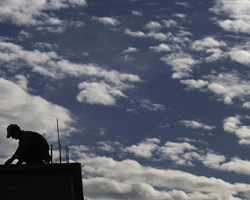Construction in West Bank settlements booming despite declared freeze
 Saturday, January 2, 2010 at 08:43PM
Saturday, January 2, 2010 at 08:43PM By Akiva Eldar- Haaretz Correspondent
1 January 2010
 A Palestinian worker at the West Bank settelemnt of Beit Arieh(AP)
A Palestinian worker at the West Bank settelemnt of Beit Arieh(AP)
Despite the construction freeze, dozens of settlements in the West Bank are experiencing a building boom, even on the eve of another visit to the region by U.S. envoy George Mitchell to try to restart talks for a final settlement between the Israelis and Palestinians.
Construction is being carried out mostly to the east of the separation fence; it began shortly after warrants were issued on November 26 freezing construction.
Haaretz toured the area on Wednesday and witnessed work being carried out in the Barkan and Ariel industrial zones, as well as the construction of housing at Ariel, Elkana North, Peduel and Kfar Tapuah. A sign at Kfar Tapuah announced plans for the construction of 65 new housing units. Israel patrols were evident, but not inspectors of the Civil Administration enforcing the construction ban. AdvertisementIn all the sites mentioned there is evidence of heavy equipment preparing the ground for construction or for the creation of suitable infrastructure.
According to data collected by Dror Etkes of Yesh Din, and by Hagit Ofran of Peace Now, construction is being carried out in more than 50 settlements and in two other industrial zones - Mevo Huron and Gush Etzion.
On December 7 a tender was published for the sale of a large plot for the construction of a commercial structure at the Gush Etzion junction.
Etkes also recorded the takeover of Palestinian farmland by settlers near the settlements of Bracha, Kochav Hashachar, Kfar Tapuah, Itamar, Elon Moreh, Susya and the outpost of Ivei Hanahal.
In a dozen settlements there was evidence of construction that had stopped, possibly because of the warrants on freezing building, or because the settlers had rushed to create facts on the ground before the order went into effect and stopped temporarily.
The Civil Administration has made it clear that "warrants for the suspension of construction" are relevant only for buildings for which the foundations were not laid on the day a warrant was issued.
Around 3,000 housing units, whose foundations had been poured at the time the order went into effect, have not been affected by the temporary freeze in construction. These are in addition to 492 housing units already approved by Defense Minister Ehud Barak.
According to Etkes and Ofran, the building boom began while the United States was demanding a construction freeze in the settlements. The local authorities issued a great number of new construction permits, mostly to isolated and relatively small settlements, but also in the larger settlements.
Contractors and settler leaders expect that some of the sites where construction was frozen, such as Beit Aryeh, will eventually be granted permits to build. A committee evaluating the demands that the ban be lifted in certain areas is set to consider the possibility, but it is still unclear if the meetings will be open to the public or if the criteria guiding the proceedings will be announced.
According to the Civil Administration, officials are busy enforcing the warrants for a construction freeze, both in settlements and in industrial zones. In areas where violations have been noted, appropriate measures have been taken in the form of investigations.
It was made clear that in cases where warrants ordering the cessation of construction are violated, further enforcement will be undertaken.
The regulations state that after such a stoppage warrant is issued, a hearing is held; only then will an order to raze the structure may be issued.
Ofran said yesterday that the real test of the ban on construction will be if the large contractors who violate the warrants are indicted and fined.
Meanwhile, according to data collected by Peace Now, construction authorized in the territories within the framework of the government-ordered freeze exceeds that which has been permitted in Israel. A total of 1,167 housing units have been permitted in the settlements per 100,000 citizens, while in Israel only 836 housing units have been built per that number of citizens.
For example, during the period of the construction hiatus, in Ma'aleh Adumim 476 housing units will be built, compared to cities of similar size inside Israel such as Rosh Ha'ayin, 149 units, Kiryat Bialik, 160 units, Dimona 59 units, and Or Yehuda, 12 units.
During the same period in Ariel, 146 units are scheduled for construction, compared to 21 in Beit She'an, 51 in Kiryat Tivon, and 32 in Sderot.
In most of the work sites, the construction is carried out by Palestinians. Kfar Tapuah is one of the few places in the territories where the settlers insist on Jewish workers.
 APJP |
APJP |  Post a Comment |
Post a Comment |